![]()
-
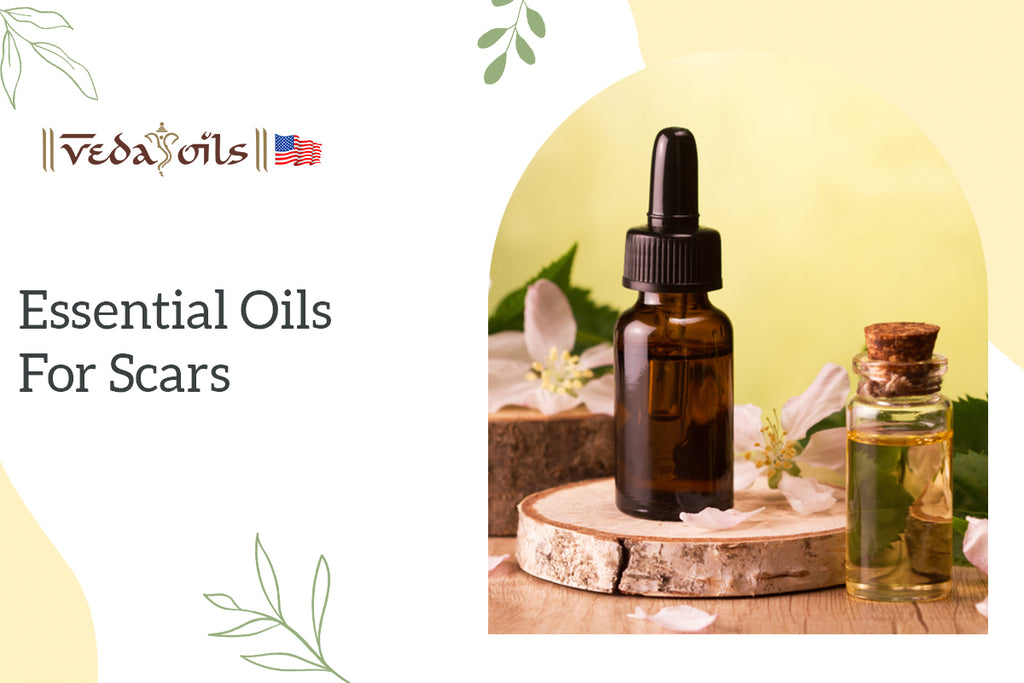
Best Essential Oils for Scars Treatment | DIY Blend Recipes for Scars
Scaring can spoil your looks and confidence if left untreated, you may never give some scars much thought since they are little or are located in obscure areas. Other scars can be more noticeable in the interim, and you truly wish you could just make those scars disappear!
The good news is that there are a number of essential oils for scars that can assist in eradicating these outward signs of trauma, along with the individual stories that each one of them represents. Let's examine the top essential oils for scars.
Types of Scars
However, not all scars are created equal; some are more difficult to treat than others. In this section of the post, we'll look at the different types of scars.
An enlarged, elevated scar known as a keloid might be pink, red, flesh-coloured, or darker than the nearby skin. They may appear following even the smallest amount of skin damage, such as an acne scar or a piercing, and may expand past the original skin harm site,
A contracture scar causes the skin to constrict and is frequently brought on by a burn (contract). Particularly if the scarring extends across a joint or into the muscles and nerves, these scars can make it difficult to move. Depressed (atrophic): Acne or chickenpox can cause these depressed scars.
An aberrant reaction to wounding healing is a thick, elevated scar called a hypertrophic scar. They most frequently happen in areas of taut skin where there has been skin trauma, burning, or surgical incisions. Medication, natural oils, freezing, injections, lasers, and surgery are all forms of treatment.
Inflammation of acne lesions leads to acne scars. The pore wall breaks down, causing the acne pore to expand. Some acne lesions are tiny, leaving superficial scars that heal fast. Blemishes occasionally leak their contents into the surrounding tissue, leaving deeper scarring.
5 Best Essential Oils for Treating Scars
Essential oils provide a wealth of skin-beneficial characteristics that help heal infections and restore the skin to its former glory. In this section of the post, we'll examine the top essential oils for scars treatment.
-
Tea Tree Essential Oil for Scars Treatment

Many people find tea tree oil to be an excellent option, especially if they are also dealing with acne. Why is tea tree oil able to improve skin health so dramatically? Numerous qualities of it, such as its antibacterial, antiseptic, antifungal, and antiviral capabilities, make it skin-enhancing. Tea tree essential oil is a popular remedy for acne scars since it works well to cure acne while also assisting in the fight against scars.
-
Helichrysum Essential Oil for Scars

The anti-allergic, anti-microbial, and anti-inflammatory qualities of helichrysum essential oil are well established. One of the helichrysum's most outstanding anti-inflammatory components, a polyphenol molecule known as oryzanol, has been the subject of scientific study. Due to these qualities, Helichrysum essential oil is the best choice for treating keloid and hypertrophic scars. Due to its high concentration of fatty acids, it heals skin cracks and scars, helichrysum essential oil is also effective on all types of scars.
-
Lavender Essential Oil Treating Scars

The essential oil of lavender may lessen the risk of scarring by encouraging the growth of cells and tissues. It is antibacterial, antioxidant, and antibiotic. A study found that lavender essential oil has the potential to be used as a natural remedy to aid in the restoration of injured skin tissues and exhibit wound-healing activity.
All types of scarring disorders are certain to be cured with regular usage of lavender essential oil. The removal of acne and accompanying scars is another prominent use of lavender essential oil.
-
Frankincense Essential Oil for Scars

Due to the ability of frankincense essential oil to regenerate skin cells, it effectively covers scars and marks. With its ability to manage melanin, this oil also helps to balance out skin tone.
Frankincense can be used to avoid scarring and to aid in their fading because of its remarkable capacity to reduce inflammation and enhance the skin's healing process. Regular use significantly lessens acne and wound scars.
-
Peppermint Essential Oil for Scars Treatment

The skin is naturally cleansed by peppermint essential oil, which also possesses antiseptic and antibacterial characteristics. It has a cooling action that calms inflammation and itchiness brought on by acne scars. Melanin production is controlled by peppermint essential oil, which helps to cosmetically lessen scars.
This oil helps to increase blood flow and provides incredible skin collagen regeneration. Regular peppermint essential oil reduces scars and marks while easing the discomfort of acne and other fungal conditions.
Essential Oil Blend Recipe for Scars
Scarring and marks are only one of the numerous problems that essential oils for scars can help with. Let's see how combining essential oils can help fade scars.
This mixture combines some of the greatest essential oils for treating scarring with the added protective advantages of vitamin E oil to provide additional hydration and speed up the healing of scars. Let's look at how to prepare and use this wonderful tonic.
Ingredients
- Helichrysum Essential Oil - 10 Drops
- Lavender Essential Oil - 6 Drops
- Lemongrass Essential Oil - 8 Drops
-
Patchouli Essential Oil - 4 Drops
-
Myrrh Essential Oil - 5 Drops
- Vitamin E Oil - 2 Teaspoons
- Golden Jojoba Oil - Fill the Bottle
- Roller Bottle - 1 Oz
Directions
- Using a funnel, add essential oils in the following order: helichrysum, lavender, lemongrass, patchouli, and finally myrrh.
- Do not tremble as you roll in your palm. Add your preferred carrier oil on top.
- To blend the oils, roll them between your palms several times.
How to Use this Scar Serum
- Apply this scar serum multiple times per day for the finest effects.
- Till the scar is completely covered, roll the mixture onto it.
- Allow drying in an open area.
- 3–4 times each day, repeat.
- When you get the desired outcomes, stop using them.
Conclusion
Ance and subsequent scarring are relatively prevalent problems that are easily addressed with essential oils. These oils provide remarkable progress in scar treatment in a short amount of time. Utilizing essential oils boosts resistance and lessens viral and fungi infections as well. To satisfy your needs, choose the finest essential oil from Vedaoils. Visit us for best essential oils for scars purchases, bulk orders are also supported.
FAQs
Q: When Can You Put Oil On A Scar?
As soon as the skin has fully healed, we advise applying diluted essential oils to your scar. Keep in mind that these oils should be used twice daily for a minimum of three months to achieve optimum outcomes.
Q: How Do You Apply Oil Scars?
For at least three months, scars should be rubbed twice daily with a combination of essential oils and carrier oils, to avoid damaged skin. Results will differ from person to person.
Q: What Is The Best Oil For Surgery Scars?
The best way to treat scars with essential oils is to massage them into the scar and combine them with a carrier oil, such as virgin coconut oil or golden jojoba oil.
You May Also Like
![]()
-
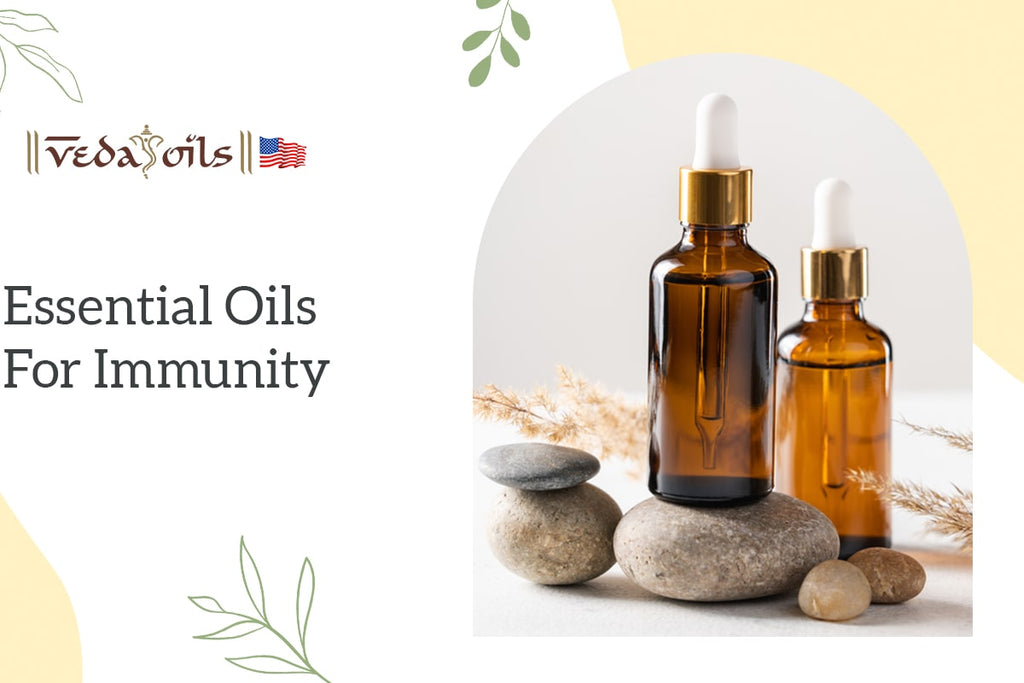
7 Best Essential Oils For Immune System | Immunity Boosting Oils
Your immune system is crucial to maintaining your health. Your susceptibility to illness may increase if your immune system is compromised. Because of this, it's critical to take all reasonable steps to support your immune system's efficient operation.You may have heard that using essential oils for immunity can strengthen your body's defenses.We'll examine what is known about Essential Oils and immunity in further detail in this piece.
Pharmacologically active chemicals can be found in essential oils. These substances, which include ethers, alcohols, aldehydes, and ketones, are what give essential oils their distinctive scent and their biological qualities for therapeutic use.
They can either strengthen the immune system or get rid of dangerous viruses and germs. Even though all essential oils have some level of antibacterial, antiviral, and antiseptic qualities, some have more of one than the other. Essential oils can fight infections, clean the air, reduce flu-like symptoms, and provide comfort during illness depending on their individual properties. Read on to know more about essential oils for immunity.
7 Best Essential Oils for Immune System
Essential oils for immune system can defend you against all types of bacteria, viruses, and germs by cleaning the air you breathe. The oils' antispasmodic and decongestant qualities aid in clearing your airways. Your body's resistance to pollution, weather changes, and cold weather decreases as you age. The warmth and closeness of essential oils reduces headaches, bodily aches, muscular stiffness, etc. You become more active as a result. Check out the list of best essential oil for immunity boosting.
-
Lavender Essential Oil for Immunity

Lavender Essential Oil is an extremely valuable oil that can be used for almost anything. Lavender is particularly helpful for immunity since it not only promotes restful sleep, which your body needs, but is also frequently used to lessen stress. Stress and lack of sleep both contribute to reduced immunity. However, lavender's antioxidant capabilities, which shield the cells from free radicals, are another way that it boosts immunity.
-
Lemon Essential Oil to Boost Immunity
Lemon essential oil is frequently used in DIY cleaners because of its potent antibacterial qualities. Additionally, it has strong antioxidant properties that can help the immune system. It also acts as an invigorating oil, enhancing your mood and leaving you feeling revived and rejuvenated.Lemon essential oils for immunity should only be applied to the skin in very small amounts and never right before exposure to the sun because it is a phototoxic substance.
-
Oregano Essential Oil for Immune System

Another essential oil that is quite helpful for enhancing immunity is oregano. It is antibacterial, antiviral, and antifungal, which makes it excellent for eradicating germs and avoiding disease. Oregano Essential Oil is thought to be particularly effective in reducing inflammation and infection.It should be used with extreme caution.Additionally, it must always be diluted and never applied to skin that is already irritated.
-
Tea Tree Essential for Immunity

Any home should have tea tree essential oil. It has potent antiviral, antifungal, and antibacterial therapeutic effects. This makes it quite effective in battling germs and a variety of diseases. Additionally, it's one of the softer essential oils, which makes it useful for practically any home. Tea tree essential oil has long been prized for its superior antibacterial properties and functions as an immunostimulant.
-
Eucalyptus Essential Oil to Boost Immunity

Eucalyptus is another essential oil that is excellent for immunity because of its potent antiviral and antibacterial characteristics. It is effective for much more than only treating respiratory diseases, although being used for that purpose frequently. It can aid in the defense against a variety of diseases, including the flu, chickenpox, measles, and others. Eucalyptus Essential Oil also stimulates the immune system in addition to the mind.
-
Frankincense Essential Oil for Immune System

Numerous health advantages of frankincense oil. It has astringent, antiseptic, and anti-inflammatory properties. According to studies, frankincense oil can strengthen your immune system, enabling you to more successfully combat bacteria, viruses, and even some types of cancer. Additionally, frankincense essential oil can help break up phlegm in your respiratory system and lungs, reducing coughing and congestion.
-
Thieves Essential Oils for Immunity

Antimicrobial qualities of thieves essential oil make it potent against airborne bacteria. Among the potential advantages are infection prevention and immune system enhancement. It has long been used as an antiviral and antiseptic to guard the body against the flu and colds.
DIY Essential Oil Blends for Immunity
Although essential oils for immunity can be helpful throughout the year, we chose these recipes for their specific immune system benefits. There are numerous applications for essential oils, here is how you can use essential oils for immune system:
Recipe 1: 5 Essential Oil Boost Blend
You can create this blend of 5 oils to boost your immune system. Read on to know more.
Ingredients:-
- Lemon essential oil- 100 drops
- Eucalyptus essential oil- 60 drops
- Tea tree essential oil- 25 drops
- Rosemary essential oil- 10 drops
- Clove essential oil- 5 drops
Directions:-
- Pour all the essential oils in a glass jar one by one and give it a nice mix.
- Add water to the water tank of the diffuser.
- You can add 5 to 10 drops of essential oil blend depending on the size of the room and your preferred level of smell intensity.
- Select the mist's duration.
- Enjoy the benefit from all that nature has to offer.
Recipe 2:
This recipe is easy and doesn't call for a wide variety of pricey oils, and smells amazing. Here is how you can make it:
Ingredients
- Lavender essential oil- 4 drops
- Eucalyptus essential oil- 2 drops
- Tea Tree essential oil- 1 drop
Directions
- Take your diffuser and fill it in with water.
- Now add all the essential oils in the given quantity one by one.
- Once done, Plug it in and enjoy a relaxing session infused with the benefits of the natural essence of these oils.
Conclusion
A strong immune system can be encouraged with the use of essential oils.Using essential oils for immunity is a wise choice because they promote both physical and mental wellness. These oils are brimming with antiviral, antibacterial, anti-microbial, and antioxidant qualities that aid in keeping harmony and balance among the intricate processes that make up our immune system.
Therefore, essential oils for immunity might be the solution if you're looking for a safe, all-natural strategy to support your body's defenses against foreign invaders. If you are looking for a place that offers a complete range of essential oils, you can log into the website of Vedaoils and find more details.
FAQs
Q: Which essential oils are good for immunity?
A: Eucalyptus, oregano, myrrh, lemon, frankincense, ginger, peppermint, and cinnamon are a few of the greatest essential oils for boosting immunity.
Q: Where do you apply essential oils for immunity?
A: You can add 3-5 drops to an aroma diffuser or apply to the forehead, neck, or temples after diluting carrier oil . It can be applied topically, dispersed or inhaled.
Q: Does Thieves oil boost immunity?
A: Thieves oil has many advantages, including strengthening the immune system, enhancing respiratory health, and battling germs.
![]()
-
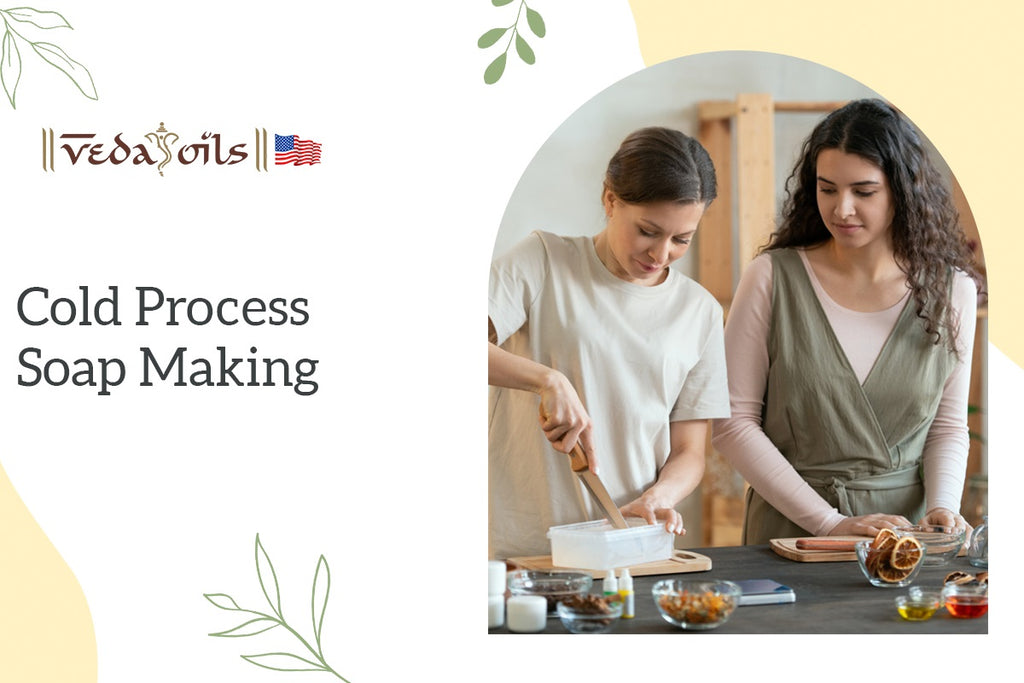
An Expert's Guide to Making Cold Process Soap at Home
Cold Process Soap Making : Making a cold process soap at home is not an as easy task as it sounds. And most importantly, there are a few factors that should be considered before formulating cold process soap. A perfect soap bar can only be yours if you put forward your best efforts. Today, homemade soaps can be very easily curated with skin nourishing and natural ingredients your skin needs and deserves.
So, if you want to customize a soap of your own at home, then here's our guide of cold process soap making at home.
What is Cold Process Soap?
Cold process soaps are generally saponified at room temperature that is curated using no warming or rinsing properties. Oils can sometimes be slightly warmed to achieve a homogenous mixture. Moreover, cold process soap making is quite a long procedure. One of the main benefits of cold process soap making is having entire control over the ingredients.

Equipment Required to Make Cold Process Soap
The different sets of types of equipment required of cold process soap making at home are the following:
- Digital Scale
- Infrared Thermometer/Digital Thermometer
- Immersion Blender
- Stainless steel pan for melting solid oils
- Large bowl for measuring liquid oils
- Small sieve (strainer)
- Heatproof jug for the lye solution
- Rubber spatula for scraping and stirring
- Empty milk or juice carton
Ingredients Required for Cold Process Soap Recipe
The ingredients required for the cold process soap recipe are the following:
How to Make Cold Process Soap at Home?
Here's how you can make cold process soap at home by following these simple and easy steps:
- Set up your desk with the necessary tools and supplies. Put on an apron or any cover cloth, rubber gloves, and eye protection. Pre-measure the components with great care. Put the liquid oils in a jug, the water in another heat-resistant jug, the solid oils in a pan, and the lye in a different container.
- Get your recycled soap mold ready. An empty beverage carton should be cleaned and dried upside down. Cut out the side with the pouring spout when it is completely dried. Block the carton's open end by inserting a piece of the material that was cut out. This makes it easier to produce a flat surface on that side of the mold than a strange form derived from the contour of the carton's top.
- Now, dissolve the lye crystals in water. Pour the lye crystals into the water and stir it well. Leave it aside in a shallow basin of water to cool. Then melt the solid oils in a stainless steel pan on low heat. Now pour the melted liquid oils.
- Once done, measure the temperature of both lye-water and the oils. Try to maintain the temperature at about 95-100 degrees. Then pour the lye solution into the pan of oils. Dip your immersion blender into the pan, and then stir the mixture. Then bring it to the center of the pan with both of your hands. Turn it off, and then stir the soap batter using the blender as a spoon. Repeat the process until the mixture thickens up to the trace.
- Now, quickly pour the soap into the mold. Give it a tap, and then settle it. Then put it in the refrigerator and leave it there overnight. You can also leave the soap solution sitting idle on the counter during this time. The next day takes the soap out of the fridge and lets it for another day.
- Let the soap cross 48 hours of refrigeration and bring it out of the mold. Cut it into the bars using a kitchen knife. You can get about 6-8 decent-sized soap bars from this batter. These soaps have a shelf life of about two years.
Difference Between Cold Process Soap and Hot Process Soap
Just like hot process soap, cold process soaps are made with oils and lye. In cold process soap, you combine the lye with the water. Cold process soaps go through the gel phase and sometimes avoid the gel phase. On the other hand, hot process soap batter is thick and lumpy and hardens into a bar. While cold process soap heats from the inside out, hot process soap heats from the outside in.
Unlike cold process soap which usually lasts for 4-6 weeks, hot process soap can be easily used immediately after it hardens. Additionally, the essential oils are added to hot process soaps after the gel phase in cold process soap. Both cold process and hot process soaps have their own set of pros and cons. It's a matter of personal preference when choosing anyone.
Conclusion
Even the world's best soap makers use the cold process method to make soaps. So if you are into soap making and wish to make soap yourself at home, then this is your time to go and implement this recipe. You can visit VedaOils USA for the quality soap making products and its recipe. After all, it is a time-tested technique and helps you enjoy a self-made soap that suits your skin and does not contain any harsh chemicals. Follow this step-by-step guide and make your own cold process soap at home.
FAQs
Q: Is the cold soap process better?
A. Yes, cold process soap is better because it typically yields a long-lasting soap bar. Moreover, they are better for the environment and for the skin too.
Q: Which are the oils that are best for cold process soap?
A. The best oils for cold process soap are olive oil and coconut oil. Other oil options can be too sticky and hard.
Q: How long does it take to harden a cold process soap?
A. Cold process soap requires patience and takes around 4-6 weeks or more days to harden in the mold.
You May Also Like:
![]()
-
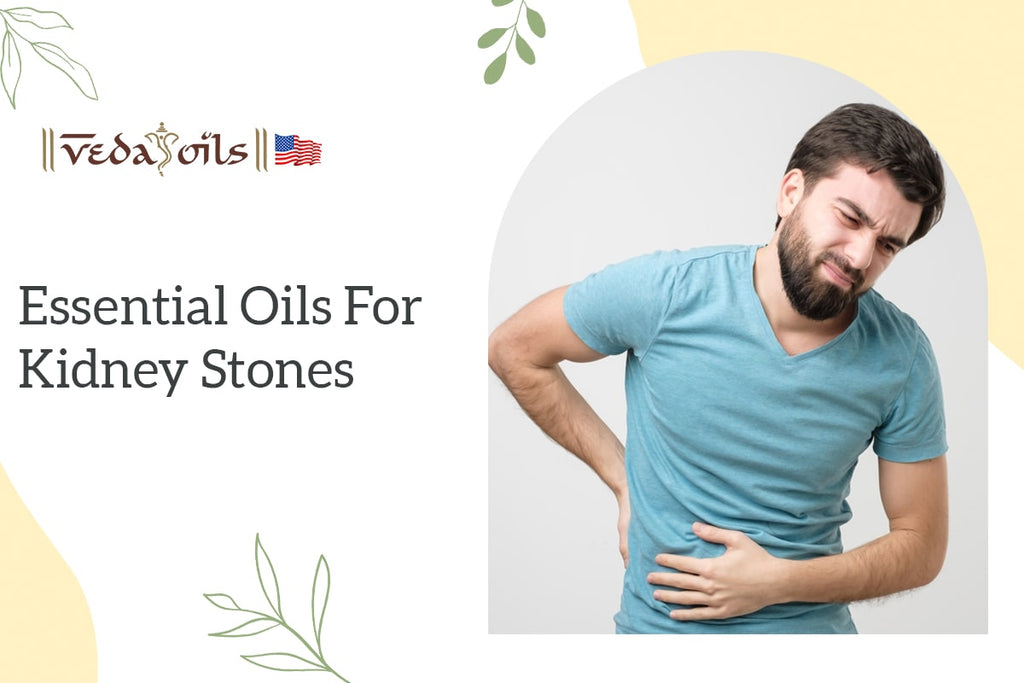
Top 5 Essential Oils for Kidney Stones | DIY Recipes for Kidney Stone Pain
These days the eating habits of all of us are kind of deteriorating. The lifestyles are becoming quite hectic which leads to improper digestion and diet. Kidney stones are one such issue that is seemingly increasing in people. In this condition, small and hard deposits are found in the kidney which is very painful. Kidney stones are basically hard deposits of minerals and acid salts that create a lot of pain when passing through the urinary tract.
A lot of people undertake heavy painkillers to get rid of kidney stones. But have you ever tried essential oils for kidney stones? They are just amazing and light, immediately the diet takes away all the pain. The essential oils are a natural medium that provides relief from pain immediately.
What Causes Kidney Stones?
Kidney stones are caused due to a lot of factors. They are hard deposits made of minerals and acid salts inside the kidneys. The main aspects that cause kidney stones are irregular diet, body weight, prior medical conditions, body supplements and heavy medications. All these are the major causes that lead to small to hard kidney stones.
5 Best Essential Oils for Kidney Stones
Essential oils play an important role in getting rid of kidney stones smoothly. Natural ways are always helpful in maintaining good health. Below is a list of some useful and prominent essential oils for kidney stones. Let's know about them below.
-
Peppermint Essential Oil for Kidney Stones

Peppermint is an extremely popular and effective essential oil for removing kidney stones from the body and provides relaxation too. The oil refreshes the mind and removes all the pain from the body. The oil is useful to improve digestive conditions and balance the body weight. It is an effective analgesic oil that cures puffiness and relieves pain spasms in the body.
The oil is anti-inflammatory and kills bacteria inside the body. Peppermint essential oil is perfect to get rid of headaches, muscle pains, and kidney stones in the body. Peppermint oil reduces stress and regularizes kidney functions.
-
Geranium Essential Oil for Kidney Stones

Geranium essential oil is a very popular essential oil for topical use to combat kidney stones. The oil is anti-inflammatory in nature and cures indigestive conditions well. The oil immediately shows results in smooth kidney functioning. The oil heals all the pain and removes bacteria.
It rejuvenates new skin cells and regularizes blood circulation. Geranium essential oil disinfects wounds as well. The oil controls blood sugar levels and removes kidney stones faster. Geranium oil removes all skin infections and makes the body active.
-
Lemon Essential Oil for Kidney Stones

Lemon essential oil helps to calm down pain and the sensation of kidney stones in the body. Its essence helps in curing kidney stone symptoms and the following pain very effectively. The oil has the ability to reduce fatigue and is antimicrobial in nature.
Lemon essential oil combats tiredness and refreshes the body as well. Lemon essential oil promotes relaxation of the mind and relieves anxiety, fungal infections, and supports proper digestion. Lemon essential oil calms kidney functioning. The aroma of the oil helps in soothing pain and relaxes the mind.
-
Sweet Orange Essential Oil for Kidney Stone

Sweet orange essential oil is one of the most widely used essential oils to combat kidney stones. It has antioxidants that help to relax the body and immediately calm proper kidney functioning. The oil brings proper refreshment to the body. The smell of the oil relaxes the body and cures body pain.
The sweet orange essential oil works at a very faster rate to heal and relieve muscle pain. The oil moisturizes the skin and makes it supple. Sweet orange essential oil is widely known for its antimicrobial activities. The oil has potent antioxidants and promotes balanced digestion which regulates stomach activities well.
-
Helichrysum Essential Oil for Kidney Stones

Helichrysum essential oil is anti-inflammatory and antifungal in nature. The oil supports curing kidney stone issues in the body. It is a wonderful oil to calm pain and regularize kidney functions. The oil has properties to combat muscle pain and heal wounds.
Helichrysum oil supports good digestion and helps in boosting health by removing all the impurities from the kidney. The oil works well on other bodily conditions too and relieves fatigue. Helichrysum essential oil is completely natural and exhibits benefits to the overall health of the kidney.
Different Ways to Use Essential Oils for Kidney Stones
To get rid of kidney stones, you can prepare natural essential oil blends or diffuse them in a diffuser. This will help in improvising proper kidney functioning. The aroma of oils will refresh the mood and reduce all body pains.
You can create a healing bath. All you have to do is spread the oil all around the bathtub and let it touch your skin and body. This will instantly help in controlling and improving kidney stones and removes all the pain.
You may also create an essential oils for kidney stones blend and apply the mixture around your stomach with the help of cotton swabs or fingertips. This will help to calm the pain and immediately cures the kidney stone sensations in the body.
The ways include all-natural ingredients along with quantities of essential oils for kidney stones too to get rid of Kidney stones instantly.
RECIPE 1 :- Healing bath
Ingredients-
- ½ cup of Epsom salts
- 10 drops of lemon oil
- 8 drops of peppermint oil
- 10 drops of sweet orange oil
- ½ cup of whole milk
Recipe and How to use
Just simply, add Epsom salts to warm water in the bathtub and allow it to dissolve completely. Then mix up all the essential oils along with precise quantities of milk and add the wholesome mixture to the water bath. Then with calmness take a soak until you find relief from kidney stone symptoms in the body.
Tip- Epsom salts can be added to warm water in the bathtub and simply left to dissolve. The balanced mixture is then added to the water bath after being thoroughly combined with all the essential oils and measured amounts of milk. After that, calmly take a bath till your body stops exhibiting symptoms of kidney stones.
Recipe 2 - Essential Oils Blend
Ingredients:
- 4 drops of helichrysum essential oil
- 3 drops of peppermint oil
- Few drops of coconut oil
Recipe and How to use
In a bowl, add 4 drops each of helichrysum and 3 drops of peppermint essential oils. Add a few drops of carrier oil, such as coconut oil, after combining the oils. Apply the mixture with a cotton swab around the surface of the stomach. This will help in regulating digestion and relieving kidney stone pain instantly.
RECIPE 3 - Diffuser Blend Recipe
Ingredients:
- 3 drops of helichrysum essential oil
- 4 drops of lemon oil
- Few drops of sweet almond oil
Recipe and How to use:-
In a bowl, add 3 drops of helichrysum essential oil and 4 drops of lemon essential oils. Mix the oils together and then add a few drops of carrier oil such as sweet almonds. Diffuse the oils blend in the bowl and spread its aroma to calm the mind and body pain.
Conclusion
Essential oils for kidney stones are so light on the skin and can be consumed to balance the kidney activities in the body. The oils help to instantly combat the symptoms of kidney stones and regularize proper functioning. Essential oils can be used in various ways and can instantly cure kidney stones. Vedaoils US is a wonderful brand that has an enormous variety of essential oils. You can buy amazing quality essential oils for curing kidney stones from vedaoils.
FAQs
FAQ1- Are essential oils safe for the skin?
Ans- Yes, essential oils are absolutely safe and have no side effects. You may use them for instant pain relief and they cure the problem of kidney stones fast.
FAQ2- Which is the best essential oil for Kidney Stones?
Ans- Sweet orange, peppermint, and helichrysum are the best essential oils to get rid of kidney issues.
FAQ3- Can essential oils immediately cure Kidney stones?
Ans- Yes. essential oils when used in a healing bath, applied on the stomach, or diffused together can immediately calm pain and cure kidney stone symptoms. Using them more often in a day will show the best instant results.
You May Also Like
![]()
-

Top 6 Essential Oils for Weight Loss : How to Use them
It is stated that the only way to remove excess body fat from the body is through a healthy diet and exercise. However, there are some simple techniques you can try to speed up your weight reduction, and aromatherapy is one of them. Do you know that essential oils can aid in weight loss in addition to their many other well-documented health benefits?
Numerous studies indicate that rubbing, inhaling, or diffusing various essential oils may also assist in accelerating weight reduction, reducing cravings, and boosting energy levels. There is no harm in giving these essential oils a try as long as you have no issues using them. Consequently, the top 6 essential oils for weight loss are listed below.
Top 6 Essential Oils for Weight Loss
Exercise does wonders for lowering weight, and when combined with the finest essential oils for weight loss, you can lose a lot of weight while also improving your health. Let's see which oils are cut
-
Lemon Essential Oil for Weight Loss
Lemon essential oil helps you lose weight while increasing your energy and mood thanks to its cleansing and rejuvenating effects. It revitalizes skin and body healing and increases vitamin C content. Every morning, add two drops of lemon to the water. Simply apply one or two drops of lemon oil to the bottom of your feet if you don't feel comfortable eating essential oils.
-
Lavender Essential Oil for Weight loss
This wonderful fragrant oil stimulates cerebral activity while promoting a sense of peace and relieving nervous weariness. With the help of essential oil, it is simpler to focus on your weight and general health. The benefits of lavender essential oil include improved sleep, pain relief, and digestion. To assist the adrenals, apply two drops to the wrists twice a day, or put them on the soles of the feet before bed.
-
Grapefruit Essential Oil for Weight loss

Numerous studies have demonstrated how eating grapefruit can aid in weight loss by regulating blood sugar, curbing the appetite, and breaking down fat. However, it has been demonstrated that grapefruit essential oil affects the same processes for weight loss as grapefruit consumption. To stimulate the flow of blood and lymph, add a few drops to the carrier oil you would use to massage or touch your body.
-
Peppermint Essential Oil for Weight loss

Peppermint has anti-inflammatory properties and cleanses the lymphatic system. It can help you lose weight and improve slow digestion. Peppermint essential oil reduces inflammation and supports the gallbladder when administered topically. Exercise is more effective because of the calming effects of peppermint and the metabolism-boosting effects of menthol.
-
Bergamot Essential Oil for Weight loss

The citrus fruit bergamot is the size of an orange and has a lemon-like hue. It is a stress-relieving essential oil, and stress is a significant risk factor for illness, disease, and emotional eating. Bergamot essential oil uplifts the spirit and promotes relaxation and a feeling of well-being while controlling cravings. Apply to the bottom of the feet every morning or add to a warm bath for the best results.
-
Ginger Root Essential Oil for Weight loss

Ginger is a well-known stomach pacifier frequently used to promote digestion and get rid of motion and nausea sickness. Ginger root essential oil is also fantastic for increasing metabolism, regulating blood sugar, and detoxifying the liver. Don't miss these Best Ways to Boost Metabolism if you want to increase your metabolism.
How To Use Essential Oils For Weight Loss
Let us share with you the most well-liked and efficient strategies to lose weight. Essential oils for weight loss are recognized for their adaptability and may be utilized in many different ways.
When massaged into the skin, essential oils for weight loss with carrier oils as a basis help break down fat. Skin smoothness and a leaner figure are the results of regular use.
Ingredients
- Fennel Essential Oil - 2 Drops
- Cinnamon Essential Oil - 3 Drops
- Juniper Berry Essential Oil - 3 Drops
- Virgin Olive Oil - 10 ml
Recipe
- Add all the essential oil into a 10 ml bottle.
- Fill the bottle with virgin olive oil.
- Mix the solution well.
- Take a few drops of this solution to your palm and gently massage your body in a clockwise motion.
- Use twice a day to get faster results.
Essential oils for weight loss have a variety of health benefits when used in aromatherapy, including better sleep, enhanced metabolism, and a smaller body, which are all promoted by treating insomnia and reducing stress.
Ingredients
- Bergamot Essential Oil - 3 Drops
- Cinnamon Essential Oil - 2 Drops
- Rosemary Essential Oil - 2 Drops
- Sweet Almond Oil - 10 ml
Recipe
- In a 10ml bottle, add all essential oil.
- Now, fill the bottle with sweet almond oil.
- Give it a good shake.
- Pour a few drops into a diffuser to get these oils' advantages.
Takeaway
By breaking down fat and speeding up metabolism, essential oils help you lose weight by promoting mental clarity and a calmer demeanor. Essential oils can promote restful sleep and provide you the energy you need to work out by reducing tension and anxiety when used in aromatherapy. Visit vedaoils to find superior essential oils for weight loss at a great price and to receive a fantastic discount on your order.
FAQs
Q: Can essential oils cause weight loss?
A: Even though essential oils cannot directly cause weight loss, they can greatly improve your diet and exercise routine. For instance, the lavender essential oil can help with insomnia, improve sleep quality, and increase metabolism. You're more likely to have a productive day when you get the right amount of sleep.
Q: How long does it take to see results from essential oils?
A: The essential oil stimulates metabolism and breaks down fat; its effects take two to three hours to show effectiveness. These essential oils give aromatherapy, which decreases appetite for overeating and helps digestive disorders, while also reducing pain and suffering when used in routine massages.
You May Also Like
![]()
-
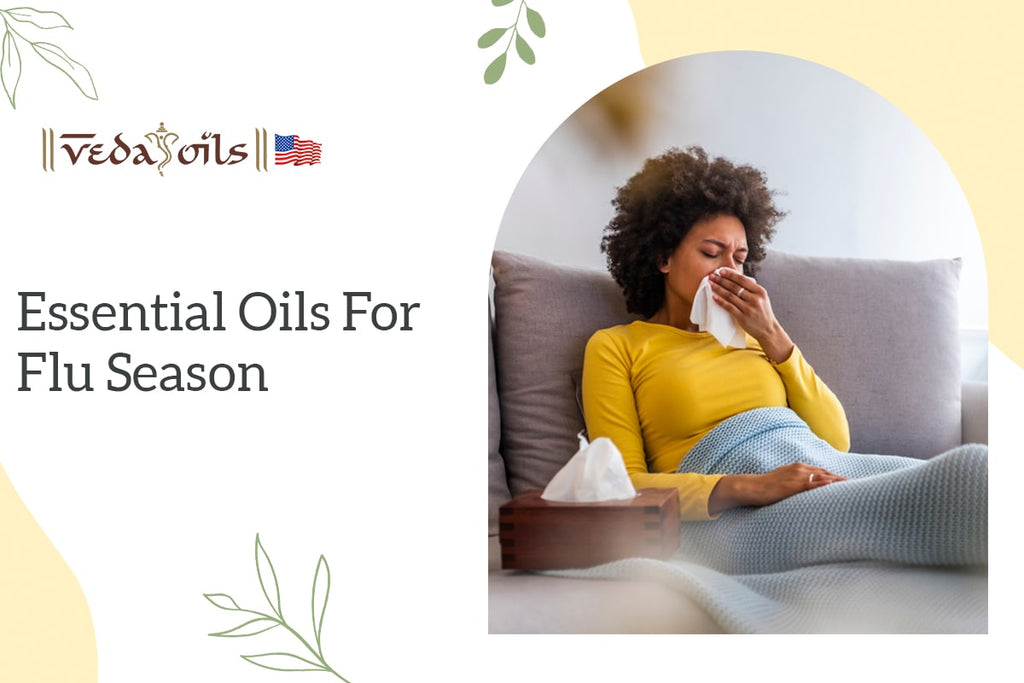
10 Best Essential Oils for Flu Season | How to Use them
You can treat flu at home typically with plenty of rest and perhaps some over-the-counter medication. However, there are many options available if you prefer natural cures. One of them is essential oils as some of these plant extracts have been researched and found to be useful at reducing the symptoms of viral illnesses. In this article, we will first discuss the top essential oils for flu season and then we will move on to the uses of these oils.
Top 10 Essential Oils for Flu Season
Here is the list of top 10 essential oils for flu season which are proven beneficial for their effectiveness in treating cold and flues symptoms. The antiviral, antibacterial, anti-inflammatory, and sedative effects of these oils make them an ideal choice.
-
Peppermint Essential Oil for Flu Season

Peppermint, a familiar smell, offers antioxidant and antibacterial qualities. The principal ingredient in peppermint is menthol, which aids in reducing coughing, and when this oil is applied topically it helps lessen discomfort, including headache. The decongestant properties of peppermint essential oil are also widely recognized.
-
Eucalyptus Essential Oil for Flu and Colds

The eucalyptus tree's leaves are the source of eucalyptus oil. Despite having antiviral, anti-inflammatory, and antibacterial effects, this oil has a strong fragrance and should never be consumed or used internally. Nevertheless, studies suggest that eucalyptus essential oil is particularly beneficial for respiratory viruses, can inactivate viruses in the air, and helps clear phlegm if you're ill.
-
Tea Tree Essential Oil for Flu

Melaleuca alternifolia, a little tree that was first discovered in Australia, is the source of tea tree essential oil. When added to an air filter, tea tree oil has been found to have antiviral and antibacterial characteristics that help in inactivating airborne viruses. Diluted tea tree essential oil can be used to clean household surfaces or can be diffused around your home.
-
Bergamot Essential Oil for Sick

According to laboratory experiments, the citrus fruit rind-derived essential oil, bergamot contains antiviral properties. In one study, the vapor of diffused bergamot essential oil drastically decreased the development of the influenza virus after just 10 minutes. Diffusing the oil in your home can effectively help reduce viruses in the air or on surfaces.
-
Oregano Essential Oil for Cold & Flu

Long before it was accepted by modern medicine, herbalists and traditional doctors had been advising Oregano essential oil to treat sinus problems and respiratory problems. It is a powerful antioxidant with active antibacterial properties that can help protect against cold and flu symptoms. It fights free radicals, guards against infectious microorganisms, and gives the immune system natural support.
-
Rosemary Essential Oil for Sick

Rosemary is utilized for more than just flavoring. It also has a reputation for owning medicinal properties. It offers a calming and soothing effect and your tracheal muscles may relax as a result, making it easier for you to breathe. Even asthma and inflammation are treated with rosemary essential oil. Numerous tonics for chest congestion make use of this oil.
-
Lavender Essential Oil for Flu

Lavender essential oil is effective in relieving pain and headache due to nasal congestion. The aroma of lavender is naturally relaxing and helps aid sleep. You can blend a tiny amount of carrier oil with lavender essential oil such as coconut, avocado, or olive oil and rub it into your temples to relieve headaches. Try diffusing it before bed to enhance your sleep and minimize nighttime disruptions.
-
Thieves Essential Oil for Flu Season

Five essential oils namely cinnamon, clove, lemon, eucalyptus, and rosemary are among the therapeutic-grade essential oils combined to create Thieves Oil, which has been shown to have strong antiviral, antibacterial, and antiseptic properties. This blend of therapeutic oils comprises elements that boost the immune system and exhibit a wide range of antibacterial activity. It is one of nature's most potent essential oils for flu due to its potency against highly contagious bacteria and viruses.
-
Holy Basil Essential Oil for Flu

Holy basil is a plant that comes from India and is utilized as an "adaptogen" in Ayurvedic therapy to deal with life's challenges. Colds, the flu, and their corresponding fevers can also be effectively treated with holy basil essential oil. It is widely used to lessen whooping cough symptoms because of its potential antispasmodic properties.
-
Cinnamon Essential Oil for Flu Season

Cinnamon may not be thought of as having therapeutic qualities, but researchers from a 2017 study discovered that it can guard against bacteria that cause respiratory issues. The cinnamon essential oil can be used to treat coughs by adding a few drops to a diffuser or using the oil in a topical mixture.
How to Use Essential Oils to Prevent Flu and Cold
Consuming essential oils directly is not advised. Whether a cold remedy is natural or not, it is never a good idea to use it without consulting your doctor. Here are a few simple ways to use essential oils to treat cold and flu:
One of the simplest and least direct methods to use an essential oil is in this manner. Simply add a few drops of the necessary essential oils for flu season to the diffuser as directed by the manufacturer, then turn it on. To provide you an aromatherapy experience that will help you go asleep, the device will disseminate the essential oil on its own.
Directly inhaling the steam from water mixed with essential oils for flu is like visiting a spa. Warm water in a bowl, a few drops of essential oils, a cloth over your head to keep the steam within, and deep breathing is all that are needed. Similar to how vaporub works, inhaling essential oils often aids in opening up the airways.
If used topically, essential oils may irritate or burn the skin. You can massage them directly onto your skin after diluting them by adding a few drops to a carrier oil like almond or coconut oil. Since essential oils are made from plants, if you have a plant, pollen, or another environmental irritant allergy, perform a tiny skin test before using them generally to prevent allergic responses.
Takeaway
Essential oils are regarded as potent medicines because they require a lot of plant components to produce them. A little goes a long way, and toxicity is a possibility. It is advised to use the bare minimum at first and then increase as tolerated. A patch test is always recommended followed by a doctor's advice in case of any allergic reactions. Vedaoils is a leading manufacturer of pure and organic essential oils for flu season. You can check out their website for more details.
FAQs
Q: Can you use essential oils for cold and flu?
A: Yes, essential oils can be used for treating cold and flu by clearing the nasal passage and easing the discomfort in breathing.
Q: Which essential oils are good for cold and flu?
A: The essential oils with antibacterial, antimicrobial, and anti-inflammatory properties are usually considered good for treating colds and flu.
Q: Which essential oil is best for chest congestion?
A: Rosemary oil is considered best for relieving chest congestion.
You May Also Like



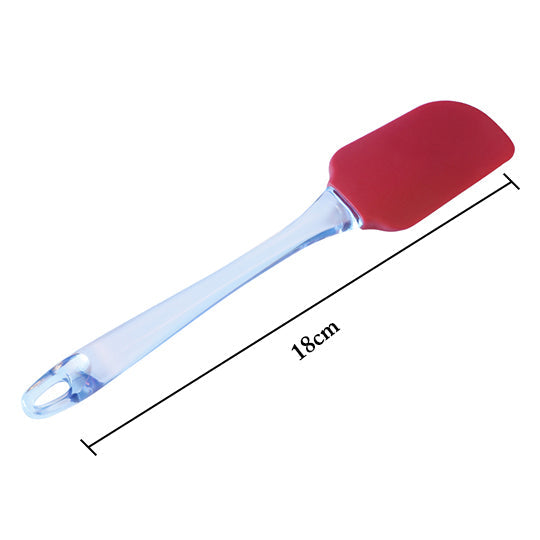







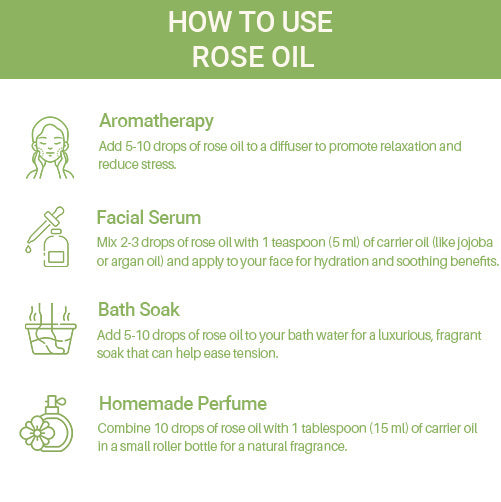

































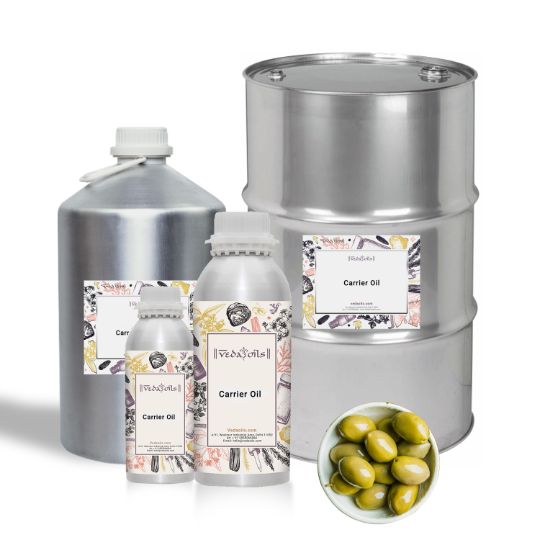
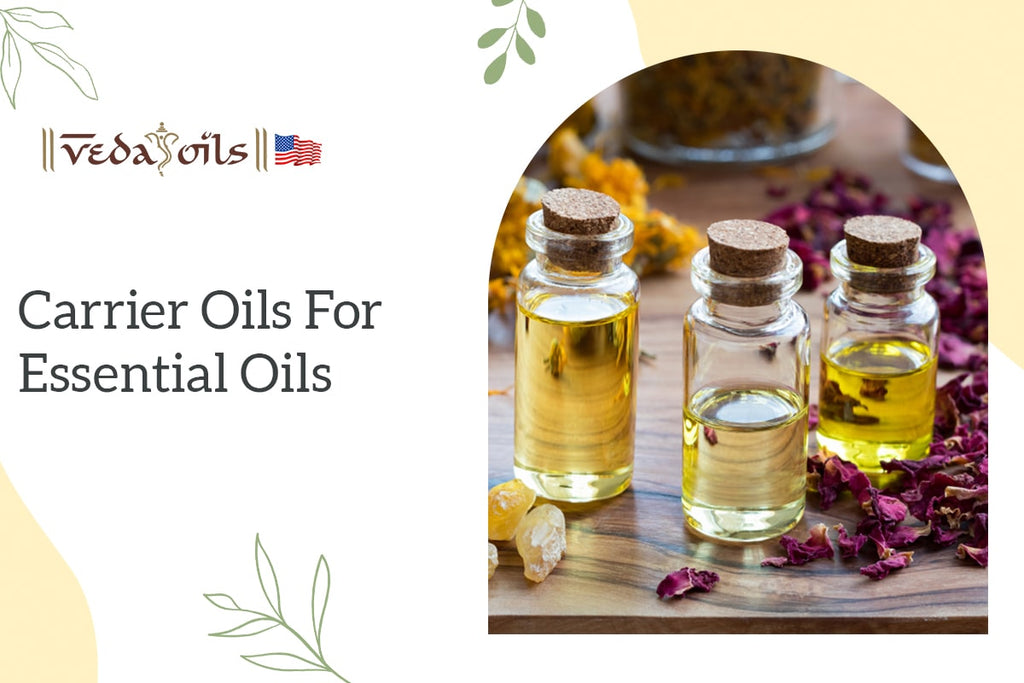
Powerful Herbal treatment is 100% guarantee for HSV cure, the reason why most people are finding it difficult to cure HSV 1 or 2 is because they believe on medical report, drugs and medical treatments which is not helpful to cure HSV and hasn’t proved any sign of helping. Natural roots/herbs are the best remedy which can easily eradicate herpes forever. I never believed it until I was helped and cured of my 16 months genital herpes with natural herbal medicines from Dr Sikies. Where other medical prescribed drugs and treatments failed, Dr Sikies natural herbs helped saved me from Genital herpes permanently and I’m so grateful for this. You can also get help from this great and powerful Herbalist Dr Sikies by reaching himon Email: drsikies@gmail.com / WhatsApp +2348163430143 website to make order now : https://drsikiesherbalcuremedicine.weebly.com/
HOW I GOT CURED FROM HERPES SIMPLEX VIRUS:
God bless Dr. OLIHA for his marvelous work in my life, I was diagnosed of HERPES since 2023 and I was taking my medications, I wasn’t satisfied, i needed to get the HERPES out of my system, I was directed by my brother in-law to meet Dr. OLIHA who is good at curing HERPES DIABETES and CANCER with his herbal medicine, I contacted him and he guided me. I asked for solutions, he started the remedy for my health, he sent me the medicine through UPS delivery service (UPS). I took the medicine as prescribed by him and 2 week later i was cured from HERPES, Dr. OLIHA truly you are great, do you need his help also? Why don’t you contact him through email: {oliha.miraclemedicine@gmail.com} visit him website https://olihamiraclemedici.wixsite.com/drolihamiraclemedici
Living with Herpes simplex was depression for me even with my doctor’s advice and medication. My name is Vicky Moore I live in Chicago, Illinois and this is my story. I browsed the Internet in search of remedies or something but unfortunately nothing new, all still had the same results. Sadly I almost quit on myself, it was around 7:30 in the morning when my therapist called me over to her house, at first I was skeptical, but I went anyways on getting there she was smiling and said there’s living proof now, she showed me a lady who also suffered from herpes simplex 3years back and now she is cured by a doctor who also studied natural herbs. I was amazed and lost for words I even doubted but showed me a doctor’s report test. So I contacted the doctor and weeks later, I was cured. So I would love to use this medium to say a big thank you to my therapist and Dr. Chalopa. This story is shared to others like me out there. However, he also treats other illnesses. Email (drchalopa @ gmail. com)
Getting cured from STD using herbal remedies is still a shock to me because I overheard my doctors saying that STD has no cure. All thanks to Dr ORAL who encouraged me and today I am living a normal life again. Recommending Dr ORAL as best Herbalist is not and can never be mistaken because I was cured from STD AND HSV1&2 through the natural remedies i ordered from him. He also has the best treatment for STD, HPV, HIV, DIABETES, ANY TYPE OF HERPES. Reach out with Dr ORAL on contact him on on WhatsApp via +2347039009036 or email him at doctororal1@gmail.com
I have been living with Oral herpes for over 4 years now and it has been a big problem for me. I have been looking for a solution because I can’t leave with it, One day I came across a woman’s testimony on a forum saying she got cured of her Herpes with the help of Dr Akhimien an herbal doctor from Africa with herbal medicine. At first I did not believe because I was not sure herbs can really take this virus away, but I have no choice than to give it a try and contacted him with his emails, I explain my problems,.. then he told me not to worry that he will prepare the a cure with herbal mixture and send it to me, I got the medicine after 4 days delivery and I use as instructed. After 21 days when the herb was almost finished, I went to a medical doctor, I did a test and discovered that the virus was gone, and my test results were HSV 1%2 negative, I was so surprised and happy! Then I wrote to Dr Akhimien and thanked him for getting me cured from herpes. I advise you to contact this great herbal doctor Akhimien as he has cures for different kinds of diseases. I decided to share this testimony to let others who also suffer from herpes know about this and give hope to others, you can reach him via Email drakhiniemodion@gmail.com also his Website https://drakhiniemodion.wixsite.com/drakhimien or WhatsApp number +2349133157031